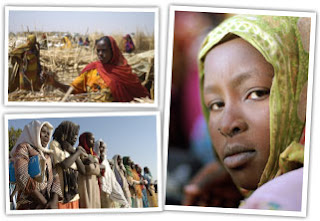
A few months back I heard from a friend about the small area in the Sudan, Darfur, and when I was told about the genocide that is occuring over there... at first I wasn't at all hit by it until I went to a website Save Darfur recently and realized the statistics of how bad it really is over there, how devastating it is. The weird thing to me was "Why had I not heard about any of this in the news? How come their government is choosing to ignore the problem?" Below I have copied the background of Darfur from SaveDarfur.org. I hope that you stop by the website and maybe even donate some money to this organization that is trying to stop the genocide over there.
"Darfur has been embroiled in a deadly conflict for over three years. At least 400,000 people have been killed; more than 2 million innocent civilians have been forced to flee their homes and now live in displaced-persons camps in Sudan or in refugee camps in neighboring Chad; and more than 3.5 million men, women, and children are completely reliant on international aid for survival. Not since the Rwandan genocide of 1994 has the world seen such a calculated campaign of displacement, starvation, rape, and mass slaughter.
Since early 2003, Sudanese armed forces and Sudanese government-backed militia known as “Janjaweed” have been fighting two rebel groups in Darfur, the Sudanese Liberation Army/Movement (SLA/SLM) and the Justice and Equality Movement (JEM). The stated political aim of the rebels has been to compel the government of Sudan to address underdevelopment and the political marginalization of the region. In response, the Sudanese government’s regular armed forces and the Janjaweed – largely composed of fighters of Arab nomadic background – have targeted civilian populations and ethnic group from which the rebels primarily draw their support – the Fur, Masalit and Zaghawa.
The Bush Administration has recognized these atrocities – carried out against civilians primarily by the government of Sudan and its allied Janjaweed militias – as genocide. António Guterres, the United Nations High Commissioner for Refugees, has described the situation in Sudan and Chad as “the largest and most complex humanitarian problem on the globe.” The Sudanese government and the Janjaweed militias are responsible for the burning and destruction of hundreds of rural villages, the killing of tens of thousands of people and rape and assault of thousands of women and girls.
With much international pressure, the Darfur Peace Agreement was brokered in May 2006 between the government of Sudan and one faction of Darfur rebels. However, deadlines have been ignored and the violence has escalated, with in-fighting among the various rebel groups and factions dramatically increasing and adding a new layer of complexity to the conflict. This violence has made it dangerous, if not impossible, for most of the millions of displaced persons to return to their homes. Humanitarian aid agencies face growing obstacles to bringing widespread relief. In August 2006, the UN's top humanitarian official Jan Egeland stated that the situation in Darfur is "going from real bad to catastrophic." Indeed, the violence in Darfur rages on with government-backed militias still attacking civilian populations with impunity.
On July 30, 2004, the UN Security Council adopted resolution 1556 demanding that the government of Sudan disarm the Janjaweed. This same demand is also an important part of the Darfur Peace Agreement signed in May of 2006. On August 31, 2006, the Security Council took the further step of authorizing a strong UN peacekeeping force for Darfur by passing resolution 1706. Despite these actions, the Janjaweed are still active and free to commit the same genocidal crimes against civilians in Darfur with the aid of the Sudanese government.
International experts agree that the United Nations Security Council must deploy a peacekeeping force with a mandate to protect civilians immediately. Until it arrives, the under-funded and overwhelmed African Union monitoring mission must be bolstered. And governments and international institutions must provide and ensure access to sufficient humanitarian aid for those in need."

No comments:
Post a Comment